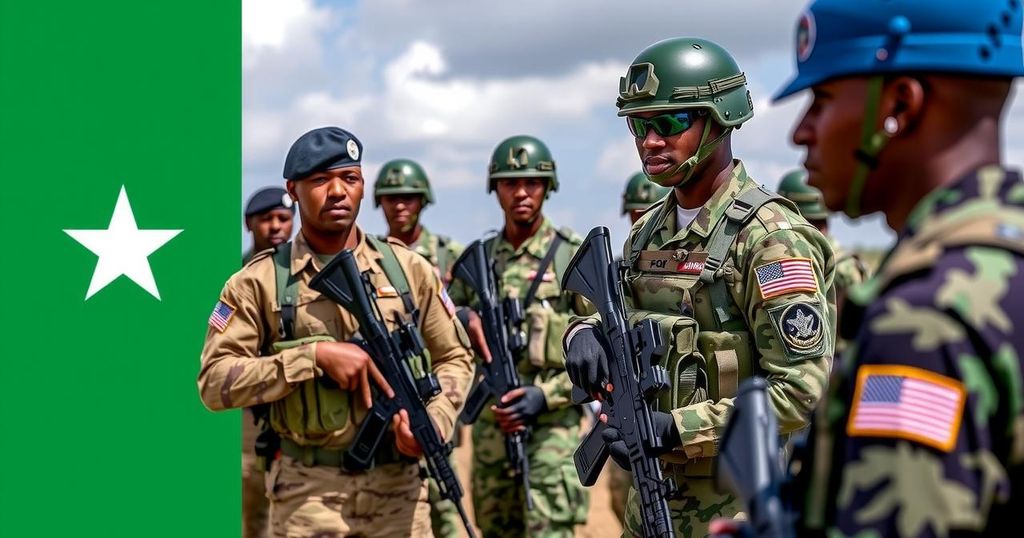U.S. Advocates for U.N. Peacekeeping Mission in Haiti Amid Escalating Violence

The United States is advocating for the transformation of the Kenya-led multinational force in Haiti into a U.N. peacekeeping mission due to severe gang violence disrupting stability in Port-au-Prince. Only a fraction of the intended police force is currently deployed, and funding remains critically insufficient for effective operations. The situation calls for urgent and coordinated international engagement as Haiti’s leadership requests peacekeeping assistance amid ongoing turmoil.
The United States has intensified its efforts to transition the Kenya-led multinational force in Haiti into a United Nations (U.N.) peacekeeping mission, prompted by escalated gang violence that has recently paralyzed air traffic to the capital, Port-au-Prince. Initially proposed in September, the U.S. plan aims to secure stable funding for the multinational force, critical for supporting Haitian authorities in combatting rampant gang control. The situation deteriorated last week when gang violence surged following the dismissal of Haiti’s interim prime minister amidst political strife. Currently, gangs are reported to dominate approximately 85% of Port-au-Prince, causing significant turmoil, including the recent closure of the main airport after an attack on aircraft, which resulted in injuries to airline staff. Efforts have been made to garner consensus among all 15 U.N. Security Council members regarding a draft resolution to facilitate this transition. This proposal urges U.N. Secretary-General António Guterres to hastily engage in contingency preparations for the transformation. However, objections were raised by Russia and China, with Russia requesting further discussions prior to advancing the resolution. Despite a planned deployment of 2,500 international police, only about 430 officers are currently in Haiti, primarily from Kenya, along with minor contingents from other nations. A further 600 police units have been promised by Kenya’s President, scheduled for deployment in November. The funding for these operations remains critically low, with the U.N. trust fund facing shortfalls against the projected $600 million required for a full year’s operation. Gang influence in Haiti has remarkably grown since the assassination of President Jovenel Moïse in 2021, resulting in increased violence, crime, and the emergence of vigilante civil defense groups. The leaders of Haiti have explicitly requested a U.N. peacekeeping force, leading to a U.S. resolution recognizing this appeal. The inaugural presence of Kenyan forces in Haiti marks the latest iteration of international military interventions in the nation, whose history spans back to at least the early 1900s. The prior U.N. missions from 2004 to 2017 were marred by significant controversy, including allegations of sexual misconduct and the introduction of cholera that claimed approximately 10,000 lives.
The transition of the Kenya-led multinational force in Haiti into a U.N. peacekeeping operation arises from a pressing need to address escalating gang violence in the region. Following a severe political crisis, the disbandment of the interim government has allowed gangs to gain unprecedented control over the capital, prompting domestic and international demands for increased security and stability through a professional and well-funded peacekeeping mission. The historical backdrop of foreign military interventions in Haiti adds a layer of complexity to current negotiations, especially given the past controversies associated with prior U.N. missions. As the U.S. seeks to initiate this transformation, the ramifications of international assistance will play a crucial role in Haiti’s recovery and governance.
In summary, the U.S. efforts to reform the Kenya-led force in Haiti into a U.N. peacekeeping mission underscore the urgent need to address the worsening security crisis influenced by gang dominance in Port-au-Prince. With significant funding challenges ahead, and historical sensitivities related to past interventions, the path forward must incorporate lessons learned to ensure a sustainable and effective peacekeeping strategy that aligns with the aspirations of the Haitian populace.
Original Source: www.usnews.com








